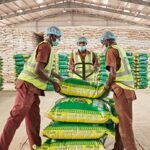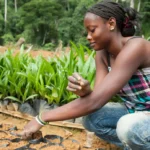When it comes to being a global food basket, Africa has enormous potential. The continent is home to 65% of the world’s uncultivated arable land, around 874 million hectares. Even so, Africa remains severely food insecure and spends a staggering $70 billion annually on food imports.
This calls for radical and ambitious goals across the spectrums of policy reforms, investments, and technology transfer. Smallholder farmers, who are the backbone of food production and represent about 80% of farms and produce up to 90% of food in some countries, must be at the engines of the new order.
Olam Agri is among those organizations with bold visions of transforming agriculture and food systems in Africa and other high-growth emerging markets.
Part of Olam International, the agribusiness giant founded in the 1980s, the company has a specific strategic focus on supply chains.
By investing in trade-related infrastructure, pushing for harmonized standards, and reducing barriers to the movement of agricultural goods and services, Olam Agri aims to be at the heart of transforming food, feed and fibre for a more sustainable future.
AgFunderNews recently spoke with Dr. Shailendra Mishra, Olam Agri global head of sustainability: food, feed, and freight on how the organization is creating value for customers and enabling farming communities to prosper sustainably and strive for a food-secure future.

AgFunderNews (AFN): Why does Olam Agri believe that well-functioning supply chains are critical in sustainable food security across the globe?
Shailendra Mishra: Olam Agri is a leading global agri-business with a global origination footprint, processing capabilities and deep understanding of market needs. Owing to our strong presence in high-growth emerging markets and products across grains and oilseeds, we are at the heart of global food and agri-trade flows with 45.1 million metric tonnes (MT) in volume handled in 2024.
We believe that well-functioning, traceable, and sustainable supply chains are the backbone of global food security. In an era shaped by climate change, and economic volatility, producing, and moving food efficiently to where it is needed most has never been more important.
Robust supply chains and an asset-light trading operating model enable us not only to keep food flowing, but also to improve access to affordable, nutritious options, particularly in markets where food insecurity is acute. Our value chains protect ecosystems while enabling farmers and rural communities to prosper. Overall, we are working to deliver both nutrition and livelihoods.
AFN: Why does Africa face severe food insecurity and how can the continent change this situation?
SM: We view the realities facing the global food situation on the prism of eight gaps. These are food gap, land gap, greenhouse gases mitigation gap, biodiversity gap and food loss and waste gap. Others are water gap, livelihood gap, and innovation gap.
Africa is deeply impacted by these global pressures. However, there’s enormous potential for transformation, and that is why we are working directly with farmers to build resilience, improve soil health, offer training on good agricultural practices, support access to inputs and finance, and connect farmers to markets.
Digital tools are helping us close gaps too, from mobile advisory services to platforms that link farmers directly to buyers.
Real food security requires partnerships, governments, private sector, and communities working in sync. When we combine local production, fortified nutrition, and open trade, Africa can strengthen its food systems and ensure sustainable growth.

AFN: How can Africa empower women and youth to increase food production when most of the land is owned by men?
SM: Africa needs to create opportunities for women and youth across the entire agri-value chain, not just on the farm. Through training, entrepreneurship, and skills development, we help them participate meaningfully in processing, baking, poultry, aquaculture, and other parts of the supply chain where land ownership isn’t a barrier.
In Nigeria and Senegal, for instance, we equip women with technical and business skills to start and grow their own enterprises. We also empower them by providing practical training, market linkages, visibility to scale their businesses and even climate-smart farming.
The outcome is that women are gaining new income streams while driving sustainable agricultural practices within their communities. These programs show that empowering women and youth doesn’t depend on land ownership, it depends on access to skills, opportunity, and markets.
AFN: Access to finance is a major barrier in the agricultural sector. How can the continent tackle this barrier?
SM: Access to finance remains one of the toughest hurdles in African agriculture. Many smallholder farmers, especially women and youth, don’t have the collateral or credit history needed for traditional banking. One way to deal with the challenge is through village savings and loan associations (VSLAs), which are highly effective.
Since 2021, Olam Agri and partners have helped set up nearly 700 VSLAs across West Africa, reaching over 10,000 members, mostly women. These groups enable members to save collectively and access low-risk loans for activities like poultry or vegetable farming.
We also focus on financial literacy and entrepreneurship. Through our training programes on business profitability and enhancing entrepreneurial skillsets, we help farmers and small agribusiness owners understand cash flow, inputs, and market dynamics, turning access to finance into long-term independence.

AFN: How can Africa mitigate climate change impacts in agriculture?
SM: Climate change has affected agricultural conditions in Africa, and is likely to continue doing so. Practical, scalable responses are needed to manage these effects. First, there is need to improve energy efficiency by expanding the use of renewables across processing facilities.
Second, the continent must promote regenerative agriculture across supply chains. We are spearheading this by training farmers in Nigeria, Ghana, Côte d’Ivoire, Chad and Togo on practices that restore soil health, conserve water, and improve yields. These cut across intercropping and minimal tillage to better nutrient management.
Finally, there is need to focus on partnerships and capacity building to make adaptation practical and scalable. On this we are strengthening food and feed value chains, supporting farmers with training, technology, and access to markets. These initiatives help improve productivity, resilience, and incomes while building climate awareness at the community level.
AFN: What can Africa do to accelerate technologically-led climate smart farming?
SM: The biggest barriers are access to training, to quality inputs, and to markets. Without those, even the best technologies won’t reach smallholder farmers.
At Olam Agri, we train farmers in climate-smart practices like soil cover, intercropping, and low-till farming. And we strengthen market access through our integrated processing network, from wheat milling to soy crushing, so farmers can sell locally at fair, stable prices.
The post Why smallholder farmers must be the epicenter of global supply chain transformation appeared first on AgFunderNews.
















